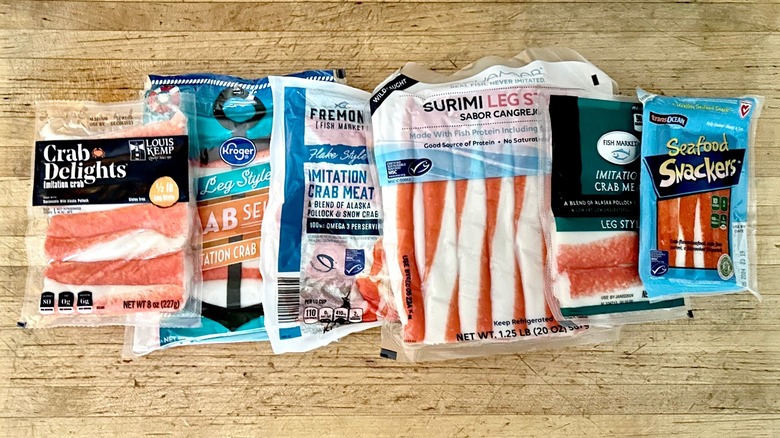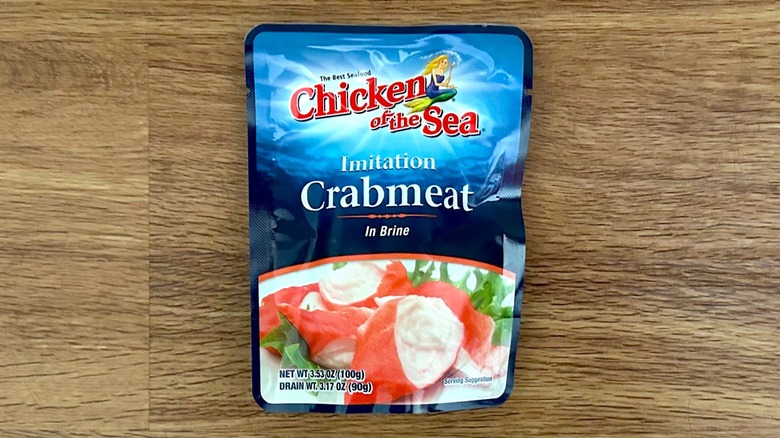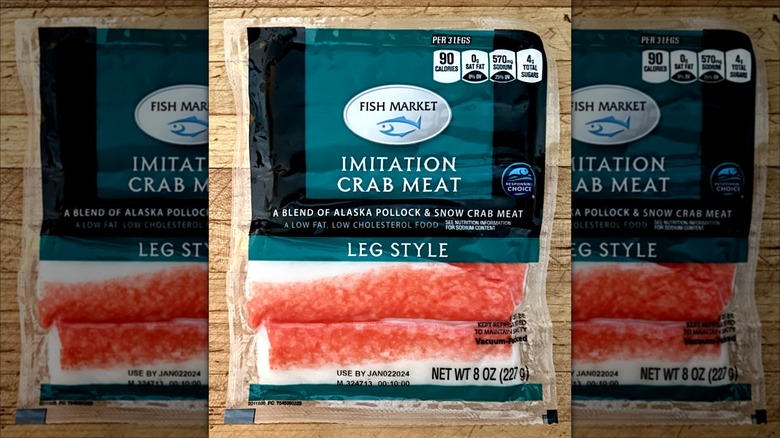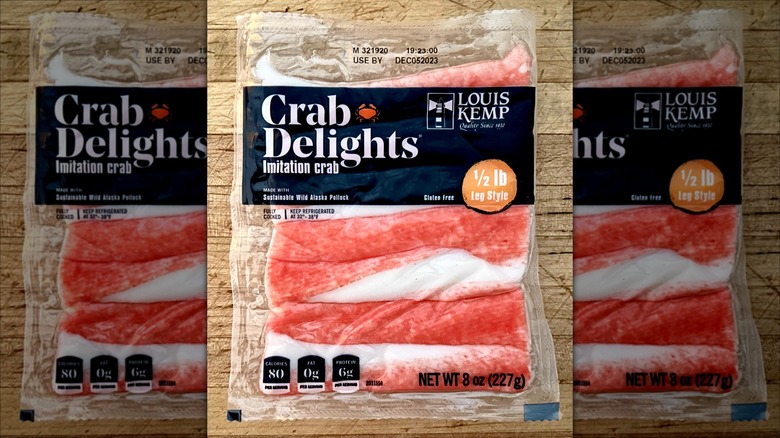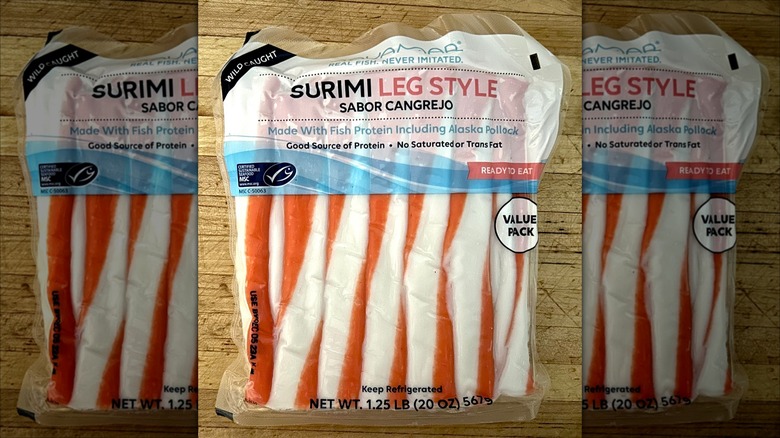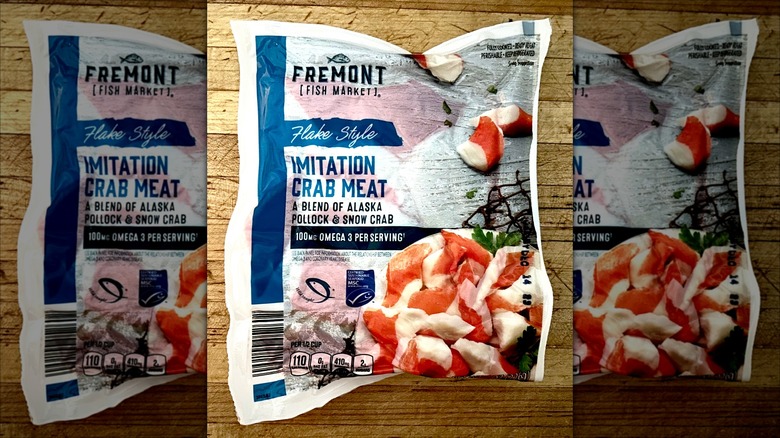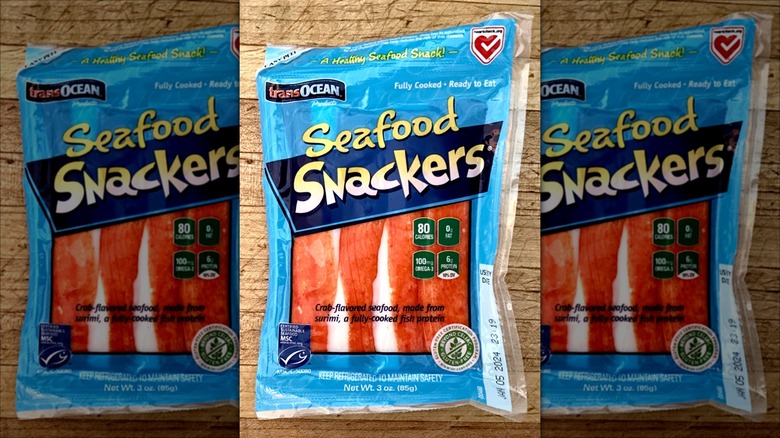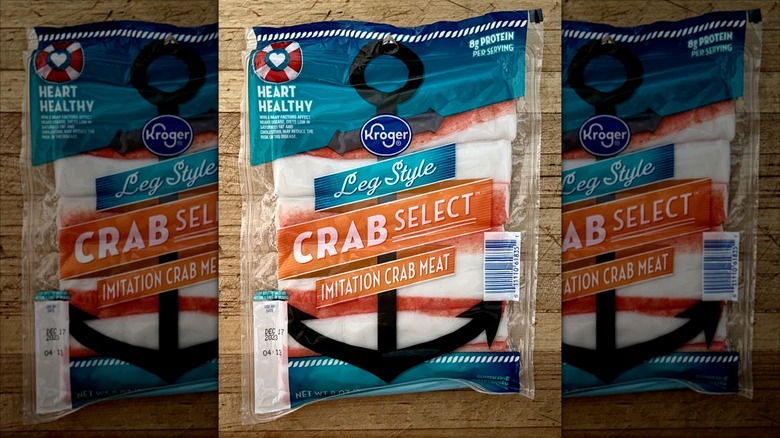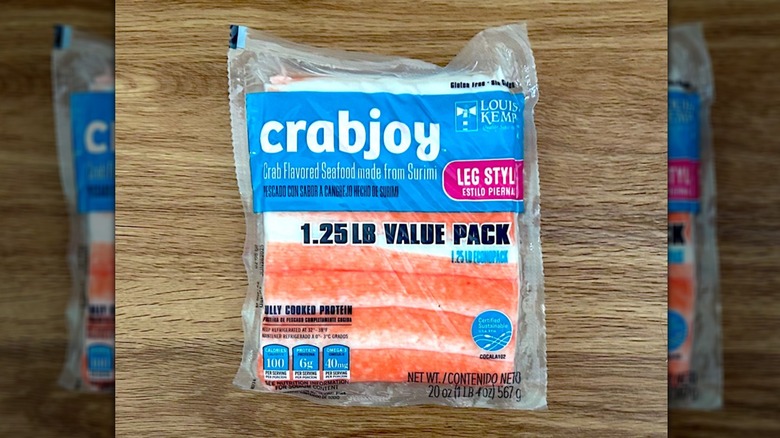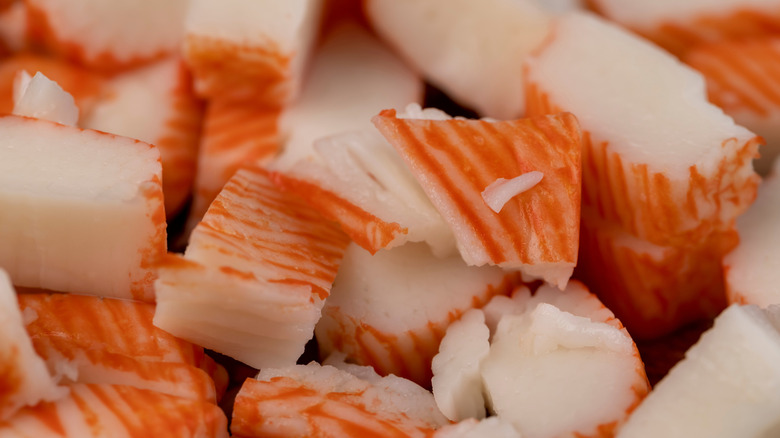8 Imitation Crab Brands, Ranked
Imitation crab, sometimes called "crab sticks" or "krab," is a popular substitute for the real deal in a myriad recipes. It's manufactured from a pulverized fish paste known as surimi, typically made of Alaskan pollock or cod that's been deboned, washed, cut up, and seasoned before being formed into rod-like shapes resembling crab legs. Once dyed, these mock crab legs are pasteurized and vacuum-sealed, ready for immediate consumption. The advantage of using imitation crab meat is its affordability compared with real crab. It can also be more convenient depending on the recipe, as it is ready to use straight from the packaging and doesn't require extensive preparation.
The downsides to using imitation crab include potential food allergies to added binders or flavorings, which can include wheat, egg whites, MSG, and food colorings. Imitation crabmeat may also pose an environmental concern depending on how the fish are harvested. Finally, contrary to popular belief, not all imitation crab products are kosher. Some brands add small quantities of real crab meat to the blend to create the appropriate flavor. For these reasons, it's crucial to read labels carefully.
We sampled imitation crab meat products from eight brands to find out out which one is the best you can buy. Read on to see how these mock crab products fared and whether you should add them to your next sushi roll.
8. Chicken of the Sea Imitation Crab Meat in Brine
At the bottom of this ranking of imitation crab meat is the variety from Chicken of the Sea. This product is convenient, as it comes in a vacuum-sealed, shelf-stable, 3.53-ounce packet. Unlike many of the other brands we sampled, this variety is made from threadfin bream, a species native to the tropical waters in the Indo-Pacific, which is frequently used to make surimi. The fish is augmented with potato starch, hydrolyzed crab protein, salt, sugar, soybean protein, artificial crab flavor, and paprika to help give it its distinctive flavor and texture.
Each pouch contains 70 calories, 770 milligrams of sodium, and 4 grams of protein. Allergens include fish, crustacean shellfish, and soy. While the Chicken of the Sea brand is known as a leader in sustainability when it comes to its tuna and salmon options, it is unclear how the fish for this imitation crab meat was sourced, which gave us some pause.
When we opened this pouch of imitation crab meat, the aroma was distinctly meaty, not fishy, which was confusing. The chunks of imitation crabmeat inside were rather slimy and they had a texture that was mealy and mushy, which was rather unappealing. The flavor was true to the moniker of this brand. This mock-crab product tasted more like chicken than fish. While there are a number of ways you can make imitation crab meat taste better, we aren't sure any of these would help this particular brand.
7. Hy-Vee Fish Market leg style imitation crab meat
Also landing low in our ranking of imitation crab meat products was the Fish Market Leg Style variety from Hy-Vee. This variety is made from a combination of wild Alaska pollock with hints of snow crab meat to improve flavor. Additional ingredients include wheat, sugar, various starches for binding, Mirin wine, pollock oil, and artificial crab flavor.
Each serving, which includes three legs, contains 90 calories, a substantial 570 milligrams of sodium, and a healthy 6 grams of protein. Allergens include wheat, soy, shellfish, and fish. A Responsible Choice label appears on this product, indicating that the seafood used was obtained sustainably, whether fished or farmed. Additionally, this product is not kosher.
Our biggest beef with this imitation crab was the flavor. It was the most aggressively fishy flavored and lacked the quintessential sweetness real crab is known for. It also had an almost astringent aftertaste, which was somewhat unpleasant. This imitation crab had the firmest texture, which did not resemble the flakiness of real crab legs — although it's also available in flake style, which might have a slightly more delicate texture. That said, this was the only imitation crab meat we likely would not purchase again, even though we appreciate Hy-Vee's commitment to sustainability in its seafood procurement.
6. Louis Kemp Crab Delights leg style imitation crab
Next on our ranking of imitation crab meat is the Louis Kemp Crab Delights leg-style variety. This product also comes in several styles, including flakes and chunks. These taste the same but their texture varies slightly, making them more or less suitable for recipes like crab cakes or seafood salads. This imitation crab is made with sustainably sourced wild Alaska pollock with tiny amounts of snow crab meat. What we appreciate about this variety is that it's gluten-free, using potato and corn starches as binders — though the packaging also cautions that it's produced in a facility that also uses wheat. Other potential allergens include fish, eggs, and shellfish, meaning that this product is not kosher.
Each serving of three legs contains 80 calories, a more moderate 430 milligrams of sodium, and 7 grams of lean protein. It also has 150 milligrams of omega-3 fatty acids, which is invaluable for cardiovascular, pulmonary, immune, and endocrine health.
While the flavor of this imitation crab was more seafood-forward than others, it lacked the sweetness that makes crab meat distinctive. Its seafood flavor lingered in the aftertaste, which was not off-putting but notable. Additionally, the texture was more on the chewy and rubbery side, rather than firm or flaky. While we might not use it in a salad or sushi, it would be perfectly serviceable cooked into something like a pasta dish.
5. Aquamar surimi leg style
The Aquamar brand of imitation crab landed next on our list. While we sampled the leg style surimi, this company specializes in producing several varieties, including leg, chunk, flake, and shreds, supplying both restaurants and grocery stores. Its products are sustainably sourced and certified by the Marine Stewardship Council (MSC). Each half-cup serving has 110 calories, 1 gram of fat, a stunning 760 milligrams of sodium, 33% of the recommended daily value, and 5 grams of lean protein.
This product is made with Alaskan pollock and/or whiting. While it doesn't supplement with crab meat, it does use a blue crab extract to produce a more authentic flavor. For this reason, allergy warnings include both fish and shellfish, and it isn't a kosher crab substitute. This product also uses both wheat and eggs as binders, as well as soy for flavor.
While we were less impressed by the nutritional profile of this brand, we thought it was decent in terms of taste and texture. Its texture was somewhat closer to real crab, though not as flaky as we would like. It was also dry, making it a bit hard to swallow, but the flavor was noticeably better than the previous varieties, having a sweeter, less overwhelmingly seafood-forward aftertaste. This product would be perfect either cooked or raw.
4. Aldi Fremont Fish Market flake style imitation crab meat
Aldi's Fremont Fish Market brand was the only flake-style variety we sampled — it was the only variety available at the time of purchase — which likely impacted our impression of the texture somewhat. This imitation crab is made predominantly from Marine Stewardship Council (MSC) certified Alaskan pollock and/or whitefish. It also includes both crab extract and snow crab meat for flavor, so it isn't kosher.
Each 1/2-cup serving has 110 calories, 1.5 grams of fat, a more moderate 410 milligrams of sodium, and 4 grams of protein. The packaging also boasts 100 milligrams of Omega-3 fatty acids per serving. Like several other varieties, this product is made with wheat and eggs as a binder and soy for flavoring.
The texture of this imitation crab can only be described as something akin to string cheese. We liked that it wasn't dry and overly firm. That said, the texture would make it more likely to work in a mock crab cake or added to a pasta dish where you might not want big chunks, as opposed to raw in a salad. While its flavor was suitably sweet and was not overly fishy, it did have a strong aftertaste that was slightly synthetic. That's likely from the myriad binders and additives in this product. Overall, we felt it was among the better varieties we sampled and would gladly purchase it again.
3. TransOcean Seafood Snackers
Near the top of our list of imitation crab products was the TransOcean Seafood Snackers variety. This brand has an impressive catalog of products in a variety of styles, from flake to leg, including a large food service sector. We had a lot of things we loved about this product, including the use of Alaska pollock and Pacific whiting that are Marine Stewardship Council (MSC) certified.
We also appreciate that these products are produced in a 100% gluten-free facility and the company advocates for the Celiac Disease Foundation. Each package, containing three ounces of imitation crab meat, has just 80 calories. It also has a moderate amount of sodium at 390 milligrams, 6 grams of lean protein, and 100 milligrams of Omega-3 fatty acids. It does contain eggs as a binder and a host of meat and extracts derived from golden king crab, blue crab, snow crab, and lobster, which may be problematic for those with shellfish allergies. This is not a kosher product.
Where this product excelled for us was in taste. It had the ideal sweet and slightly seafood-forward flavor that encapsulates the essence of real crab. While the texture was a touch firm for our taste, it wasn't distracting. This product would be ideal in raw and cooked preparations, particularly a seafood salad or pasta dish with plenty of garlic and butter.
2. Kroger leg style Crab Select imitation crab meat
Our second favorite brand of imitation crab meat by a long way was the Kroger Leg Style Crab Select. It's also available in a few other forms, including flakes, chunks, and leg styles geared to accommodate any preference for your favorite recipes. While there's no specific indication regarding the sustainability of the Alaskan pollock used in this product, Kroger indicates that 88% of its wild-caught seafood is sustainably sourced, as is 96% of its farm-raised seafood.
This brand is gluten-free and made without any gluten-containing grain or products. It does have eggs and flavoring extracts from blue crab, snow crab, and lobster, making it unsuitable for those with shellfish allergies or needing to follow a kosher diet. Each two-and-a-half-ounce serving has just 80 calories and a hearty 8 grams of lean protein. It also has a moderate 410 milligrams of sodium.
This imitation crab was superior in both taste and texture, with the texture being as close to actual crab meat as we have experienced in an imitation crab product. It was flaky, juicy, not gummy, and firm enough to give it a great mouthfeel. The flavor is also convincingly authentic. It isn't fishy or overly seafood-forward, has the right balance of sweetness, and has no lingering synthetic aftertaste. This imitation crab gets a solid A ranking from us and would be perfect for any recipe, including an elegant sushi roll.
1. Louis Kemp Crabjoy leg style
The highest ranking brand of imitation crab we sampled was the Crabjoy leg style variety from Louis Kemp. This product is also available in flake-style and snack bites. Each 20-ounce package contains 6.5 servings. Every 2.5 leg serving has 100 calories, 720 milligrams of sodium, and 6 grams of protein. This imitation crab is made from pollock or whiting, which are bound together with wheat and potato starch. These are seasoned with mirin wine, egg whites, and both natural and artificial crab flavorings. Allergens include wheat and soy. This surimi is sustainably-sourced and the package bears a Responsible Fisheries Management (RFM) Certification label on it.
From a quality perspective, we were quite pleasantly surprised by this brand. It outperformed the Crab Delights line of Louis Kemp products in every way. The aroma had a refreshing, delicate scent that was mildly fishy, yet pleasant. Its texture was en pointe, pulling apart in shreds that were flaky, yet firm. Where this crab really shone was in the flavor department. The taste was remarkably similar to real crab, having that quintessential sweetness and mellow, briny flavor that is reminiscent of the ocean, yet not overpowering. This imitation crab would work in any number of incredibly delicious recipes, including egg dishes, cakes, dips, soups, salads, and more. We will definitely be buying this one again to keep on hand when we have a craving for crab, but don't want to bust the bank on the real deal.
How we ranked the imitation crab brands
For this ranking, we purchased eight commonly found imitation crab meat products from various retail outlets. We evaluated them on texture, flavor, and how convincing they were compared with real crab.
